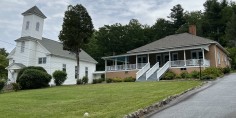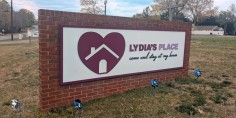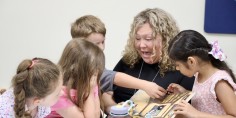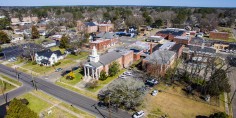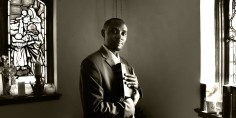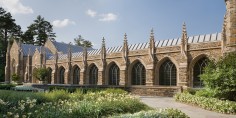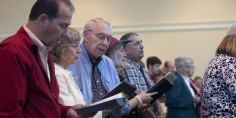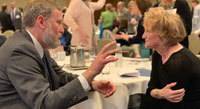
Rural Church Director Robb Webb (left) and author Krista Tippett collaborated on this spring’s civil conversations workshop in Asheville.
This spring, The Duke Endowment’s Rural Church program area and Duke Divinity School invited more than 180 United Methodist leaders to Asheville for the latest in a series of workshops on cultivating civil conversations. Called “Continuing the Conversation: Embracing the Power of Welcome,” the event aimed to give these pastors and lay leaders tools to help their churches and communities navigate today’s polarizing debates over politics, religion, race and human sexuality while maintaining mutual respect despite differences.
Robb Webb, director of the Endowment’s Rural Church program area, explains how the Endowment’s partnership with rural Methodist churches led to the workshops on civil conversations.
James B. Duke, the Endowment’s founder, mandated that the organization help strengthen rural Methodist churches in North Carolina so they can strengthen their communities. How does the concept of nurturing civil conversations figure into that charge?
When I look at the landscape of our communities in North Carolina, I’m seeing more and more normalization of division and, in my mind, you can’t really do the programs that we hope to do if the posture is division. You’ll only serve a certain group of people – those that look like you or that you’re comfortable with.
The very best church-run literacy program, the very best nutrition program, the very best health care program, the very best child care program, will be limited in its scope if we can’t figure out some way to speak across our divisions.
What makes rural churches good conduits for this message of reconciliation?
I think the church is the best place for having these conversations because we have a theology that orients us to this notion of an Imago Dei, which is Latin for the “image of God.” It means everyone is made in the image of God. If you take that seriously, then we shouldn’t have these deep divisions. We should have differing of opinions, but we should be striving for the sense that we’re moving toward building this kingdom together – not separate kingdoms or subsections of groups.
Is it about trying to hammer out compromises on these tough subjects? That seems particularly hard in this day and age. The United Methodist Church itself has struggled to find consensus on gay ordination, for instance.
What it’s not about is trying to get everybody to think the same – and it’s not to say, “We’ll just have to agree to disagree.” It is to say, ‘I want to know you,’ and ‘I want to be known by you,’ and in that knowing, how can we figure out how to move forward? That is the objective.
How will helping pastors navigate tough conversations translate into more vibrant rural churches and communities?
The idea is to get in a room with people that you wouldn’t ordinarily get in a room with and begin to have a conversation with them, and then let the challenges of your community bubble up – and you draw on the assets within your community to address those challenges. Rather than churches deciding that the community needs a food pantry, why not ask the community, and do that in a way that demonstrates humility and invites people into the conversation?
Too often, philanthropy in general doesn’t offer people an opportunity to name their story and claim their truth. My hope is that we can begin to show a different way.
Many of the speakers and presenters at the event were experts at cultivating civil conversations on difficult topics, including PBS podcast host and author Krista Tippett. How do you keep the momentum going?
The idea was to say to the pastors, ‘If this resonates with you, this is work that can keep going.’ We actually introduced the topic during our annual Convocation on the Rural Church in August 2018 and we’ve provided workshops throughout the year because we knew this topic was challenging. The event in Asheville this spring was kind of a booster shot, and we’re continuing workshops throughout the year.
What have you learned about how hard or easy it will be to bridge our divides?
I learned that we have significant work left to do. In some of the conversations I heard around tables, people were opening up and having sincere and hard discussions. It showed that we need to continue along that path. I think people really want to do this. They don’t know how, they don’t know what’s a safe container for it, but they want to do it. There are deep, deep, deep divisions in the world, particularly in the church.
Divisions around what, specifically?
Particularly about race, socioeconomic divisions, and then geographic or rural/urban. I think what undergirds them all is unresolved questions around race.
More so than the LGBT issue?
Both of those are really important, but I think we’ve lived with the race one the longest. At its root, it has created a framework, or the playbook, for how you would dismiss, disparage or discriminate against those who are different.
Does this effort make you more hopeful about healing our differences?
I am feeling positive. We held this event the week before Palm Sunday. Pastors were in the middle of Lent. It wasn’t a short drive for many of them, and it’s not a particularly light topic, so to have 185 people show up made me grateful for people’s willingness to lean into this work. That shows there’s a hunger and a desire to do the work.

